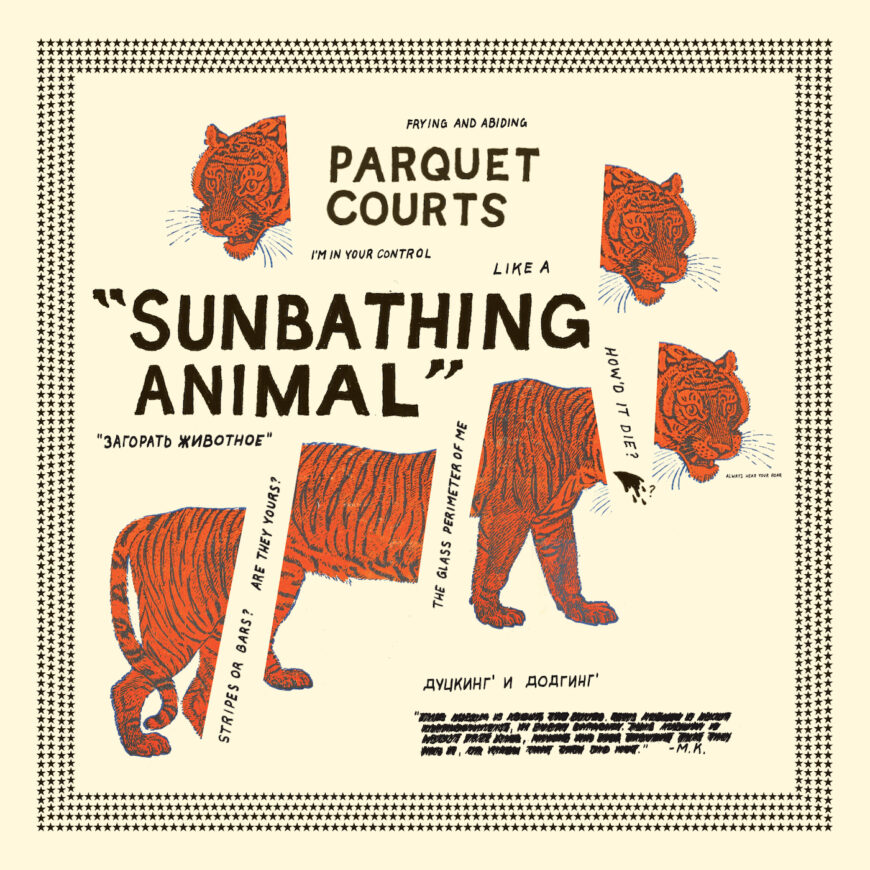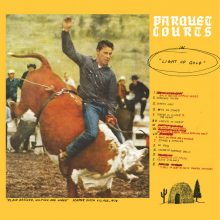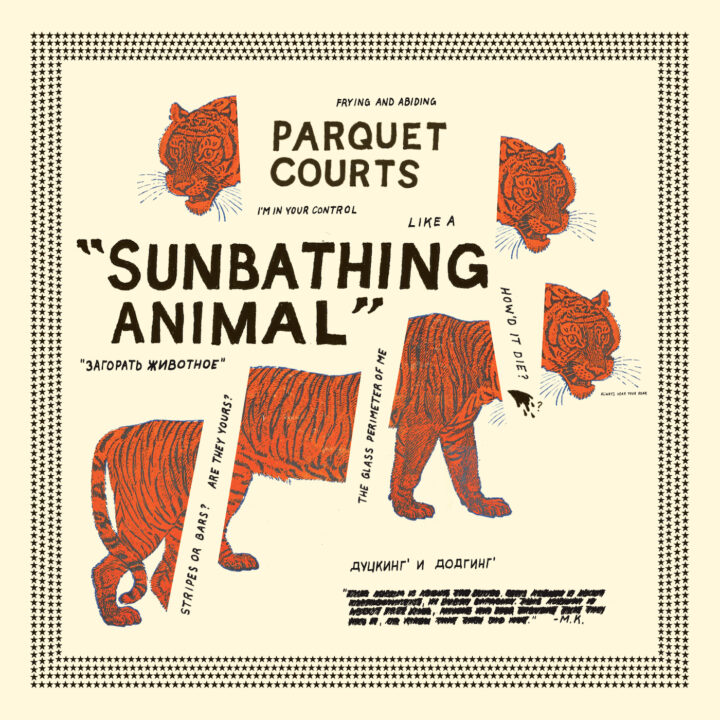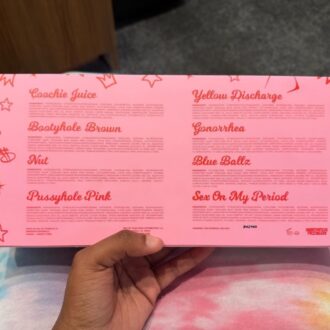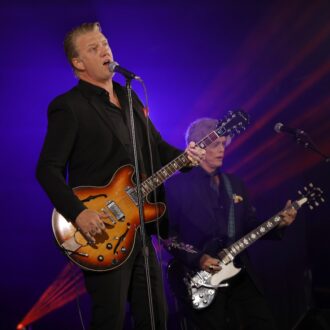Parquet Courts had everything an up-and-coming band could theoretically want. As 2013 yielded to 2014, they had accrued a breathless round of buzz and press acclaim thanks to the re-release of their 2012 album Light Up Gold. Here was a band heralded not just as clever and masterful young torchbearers for all the most tasteful corners of indie and post-punk history, but also the next big thing out of New York. They toured heavily; they quickly built an adoring audience. But by the time Sunbathing Animal arrived, 10 years ago today, Parquet Courts had spent a lot of time telling everyone, “You’ve got it all wrong.”
Though most members of Parquet Courts had been making music for some time, their success seemed sudden, near overnight. Once the band had cohered in Brooklyn — old Texas pals Andrew Savage and Austin Brown on guitars and vocals, Sean Yeaton on bass, and Andrew’s younger brother Max on drums — they’d released a limited cassette called American Specialties. Then, in 2012, they returned with Light Up Gold; originally released on Andrew’s own Dull Tools label, the early pressings quickly sold out.
The January 2013 re-release on What’s Your Rupture? quickly catapulted the band to a lot more attention. The album’s thirty-odd minutes overflowed with immediately iconic lyrics, unshakeable hooks, and ingenious fried guitar interplay that signaled focused, hungry minds pillaging rock history. By way of introduction, recognizable tropes fell on the band: stoner slacker-rock, ’90s indie acolytes, nervy New York rockers. These were not mantles they were all that interested in carrying.
In the meantime, Parquet Courts had kept working. They began writing material destined for Sunbathing Animal basically as soon as they wrapped Light Up Gold. Between tours, they congregated for two recording sessions in 2013. These were fruitful gatherings, first yielding the October 2013 EP Tally All The Things That You Broke while also laying the groundwork for Sunbathing Animal. One final session in 2014 resulted in new material, new angles. While most of us were still getting to know Light Up Gold, Parquet Courts were furiously concocting their next act.
Though Sunbathing Animal had gestated over time, it almost seemed like a rapid-fire response to the album most people heard as the band’s effective debut. While not a complete about-face, the album actively worked against so much of what people had (perhaps reductively) framed Light Up Gold as — so much so that it initially seemed a knee-jerk rejoinder against the band’s recent past. Reactionary though it may have been, little this band does is lightly considered. Soon, their third-but-sort-of-sophomore album would reveal itself as a carefully, deliberately plotted renegotiation of what Parquet Courts were, and how they would be seen.
By design, Sunbathing Animal both shaved down Parquet Courts’ music while also expanding it. The first thing you noticed was the rockers. Many of them were snarling, relentless things, like the frantic bark of “Black And White” or the single-note controlled chaos of the title track. “Always Back In Town” and “Ducking And Dodging” hammered away: one idea, turned just this way and that. Chafed by what they perceived as listeners missing the lyrical sophistication and complexity of Light Up Gold, Savage and Brown purposefully employed less obvious hooks and less “Socrates died in the fucking gutter!” pull-quotes (even if the album still included a few great one-liners). The music was hardened, the lyrics foregrounded.
When I spoke to Parquet Courts ahead of Sunbathing Animal’s release, it was clear that this was all a clearly delineated mission this time around. While journalists (like myself) were understandably interested in parsing the meteoric rise we seemed to be witnessing, the band members were understandably uninterested in reflecting on achievements like their late-night performances. If you revisit any other interviews from 2014, the tone was consistent. Parquet Courts were actively pushing back on the slacker-rock and New York narratives. They were far more interested in outlining the dense intersection of themes that filled these new tracks, explaining that this band had more going on. And forget about “Stoned And Starving,” the instant-classic Light Up Gold track from which so much of the “misconceptions” about Parquet Courts emerged: They didn’t want to talk about it, and it’d be years before it was allowed back into the band’s live sets.
Once Parquet Courts explained those themes, their mood made a bit more sense. Much of Sunbathing Animal revolved around unbreakable cycles, including the sense of being beholden to something that is pleasurable yet also in total control of you. The idea was summed up in the titular image, taken from Savage’s observations of his pet cat. But it wasn’t hard to extrapolate what was going on here. You could consider a band suddenly on the road, without end, zig-zagging a continent playing the same songs every night. You could consider young people in cities, fueled by electricity but drained by the ever-increasing impossibility of residing there. You could consider people addicted to phones, and news, and all the other dopamine hit detritus that fills our days and re-routes our brains. These were just the modern iterations Parquet Courts represented; it wasn’t a mistake they nodded to blues archetypes across the album, the repetition of musical forms one more way the album underlined that much of this was, on some level, instinctual and eternal behavior hard-wired into us.
In other ways, though, Sunbathing Animal opened Parquet Courts’ world up. Light Up Gold had already felt bigger than its brisk running time simply thanks to the amount of ideas the band crammed into it. Sunbathing Animal was significantly lengthier than its predecessor and felt twice as long. In between feral bursts, the band also sprawled out. The languid crawl of “She’s Rollin” might’ve dovetailed with the same themes of repetition and captivity, but the poignant “Instant Disassembly” hinted at just a little bit of catharsis towards the album’s conclusion. Perhaps more importantly, these songs began to sketch out that Parquet Courts’ palette was broader than some might’ve expected.
While Parquet Courts’ attitude around the time of Sunbathing Animal could’ve made them seem “difficult,” perhaps it was a necessary reset button. Both stylistically and spiritually, Sunbathing Animal now feels as if it did more to establish what this band would become than Light Up Gold did. The quartet successfully quelled the exact timbre of media hype that had surrounded them, but soon they did the steady hard work of constant touring and prolific recording while not sacrificing the high standards of their work. That’s how we know Parquet Courts today: not the hot story of the moment but a beloved institution, with the kind of batting average that makes it hard to imagine they’ll ever make a bad album.
Eventually, Parquet Courts would want to have some fun, and they injected pop and dance forms into their own music, on their own terms, with more recent works Wide Awake! and Sympathy For Life. Their albums have grown no less brainy, but perhaps less standoffish than Sunbathing Animal. Maybe that makes Sunbathing Animal its own kind of rock history trope: the both bleary- and bug-eyed followup to the breakthrough, gnashing and bucking as an artist wrestles with what their story has become. Today, it’s easier to appreciate Sunbathing Animal without all that narrative baggage — an important part of the foundation, stamping out one notion of Parquet Courts to leave the door open for a decade’s worth of new ones.
